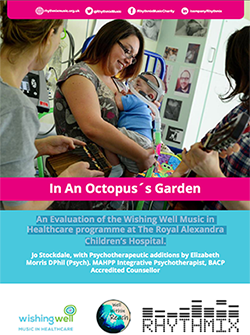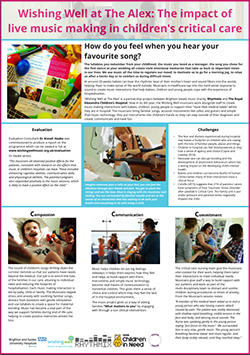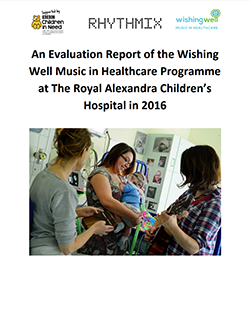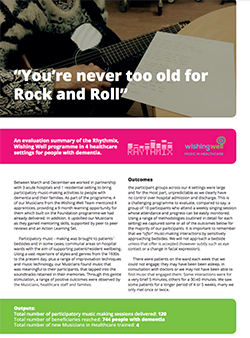Evaluation

In An Octopus´s Garden
An Evaluation of the Wishing Well Music in Healthcare programme at The Royal Alexandra Children’s Hospital.
We worked with Well Within Reach to better understand two areas. Firstly, how music-making interactions support a child’s developing brain and nervous system and secondly, the fundamental importance and impact of the musicians wellbeing on the vulnerable children that they work with. This evaluation report presents the key findings following a year of observations, training and discussions and offers a toolkit of research, frameworks and further reading that will be of interest to musicians, organisations and funders working to support wellbeing through creative interactions.
The evaluation process led to the creation of a Competency and Values framework, relating specifically to music in healthcare practice. We will use this as a reflective tool and training framework for established and emerging Musician in Healthcare.

Academic Poster
The impact of live music making in children’s critical care
Music helps children let out big feelings sideways; it helps them express how they feel and helps us build rapport with them. Instruments and simple music technology become vital means of communication to nonverbal children. This gives them a sense of choice and control which they may feel the lack of in the hospital environment. The music project gives us a way of asking families ”What matters to you” by engaging with through a non clinical intervention.

Wishing Well at the Alex
An analysis of personal reflections from the Wishing Well Musicians in Healthcare
“The musicians all observed positive effects for the patients, consistent with research on the effects that music in children’s hospitals can have. These included enhancing cognitive abilities, communication skills, and physiological abilities. The parents/caregivers also responded positively to the music sessions, which is likely to have a positive effect on the child.” – Dr Anneli Haake, BA (Hons), PCHE, PhD The results suggest that:
- The Wishing Well programme has positive effects for patients, families and caregivers
- a balance is needed between welcoming staff’s assistance in prioritising which patients should take part in the music activities and allowing the musicians to use their expertise when approaching patients, in order to achieve the most positive outcome for patients
- opportunities for musicians to practice self-care are necessary in order to avoid burn out’ and emotional trauma.

“You’re never too old for Rock and Roll”
An evaluation summary of the Rhythmix, Wishing Well programme in 4 healthcare settings for people with dementia.
“These sessions are meaningful and person-centred to each individual family member (resident). They help to encourage a sense of connection to others and reality. A feeling of togetherness is evoked. The music helps to provide relaxation, engagement, empowerment, stimulation, emotional connections. It has been
an emotional, heart-warming, and highly enriching experience. Please accept my sincere gratitude.”
Gill Hume, Wellbeing team leader, Haviland House.